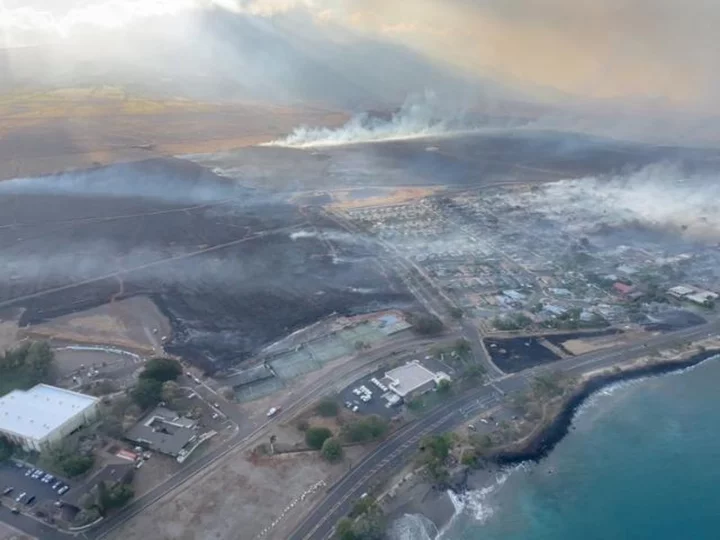Portable mobile hotspots have arrived in Maui to help bring internet service to the thousands of people who may have been unable to call for help since the wildfires started to rage out of control on the island.
Verizon told CNN on Thursday its teams are currently deploying the first batch of satellite-based mobile hotspots at evacuation sites in areas of greatest need, particularly the west side of the island, west of Maalaea, Lahaina and Northern Kapalua.
Verizon's larger equipment, which is being barged over from Honolulu, is expected to arrive later in the day. This includes COLTs (Cells on Light Trucks) — a mobile site on wheels that connects to a carrier's service via a satellite link — and a specialized satellite trailer used to provide service to a cell site that has a damaged fiber connection.
"Our team is closely monitoring the situation on the ground and our network performance," a Verizon spokesperson told CNN. "Verizon engineers on the island are working to restore service in impacted areas as quickly and safely as possible."
The company said it is working closely with the Hawaii Emergency Management Agency and the Maui County Emergency Operations Center to prioritize its network recovery.
Other carriers continue to mobilize their efforts, too. An AT&T spokesperson said it is working with local public safety officials to deploy SatCOLTs (Satellite Cells on Light Trucks), drones with cell support and other solutions across the island, as equipment comes in from neighboring islands.
Meanwhile, a T-Mobile spokesperson said its cell sites are "holding up well during the fires" but commercial power outages may be disrupting the service for some customers. "As soon as conditions allow, our priority is to deploy teams with portable generators that will bring temporary power back to our sites," the spokesperson said.
The Maui disaster has already wiped out power to at least 14,000 homes and businesses in the area, according to PowerOutage.us. Many cell towers have backup power generators but they have limited capacity to keep towers running.
"911 is down. Cell service is down. Phone service is down," Hawaii Lt. Gov. Sylvia Luke told CNN on Wednesday morning.
Verizon, T-Mobile and AT&T said they are waiving call, text and data overage charges for Maui residents during this time.
Why cell phone service went down
Although strong winds can sometimes threaten cell towers, most are strong enough to handle the worst that even a Category 5 hurricane can bring. Fire, however, complicates the issue.
"When the fires get too close to cell sites, they will obviously burn equipment, antennas, and feedlines," said Glenn O'Donnell, VP of research at market research firm Forrester. "In extreme cases, they will also weaken the towers, leading some to collapse. The smoke and flames can also attenuate [reduce the strength of] signals because of the particulate density in the air."
If a tower collapses, cell networks could take months to be restored. But if carriers are able and prepared to do restorations with mobile backup units, it could bring limited service back within hours, O'Donnell said. Wireless carriers often bring in COWs (Cells On Wheels), COLTs and GOaTs (Generator on a Trailer) in emergencies to provide backup service when cell towers go down.
Cell towers have backup technology built in, but this is typically done through optical fiber cables or microwave (wireless) links, according to Dimitris Mavrakis, senior researcher at ABI Research. However, if something extraordinary happens, such as interaction with rampant fires, these links may experience "catastrophic failures and leave cells without a connection to the rest of the world."
And, in an emergency, a spike in call volume can overload the system — if people are able to get reception.
"Even cells that have a good service may experience outages due to the sheer volume of communication happening at once," Mavrakis said. "Everyone in these areas may be trying to contact relatives or the authorities at once, saturating the network and causing an outage. This is easier to correct, though, and network operators may put in place additional measures to render them operational quickly."
Although it's unclear how long cell phone service could be down in affected regions, companies have been able to bring connectivity to disaster regions in the past. In 2017, Google worked with AT&T and T-Mobile to deploy its Project Loon balloons to deliver internet service to Puerto Rico in the aftermath of Hurricane Maria.
Project Loon has since shut down.

